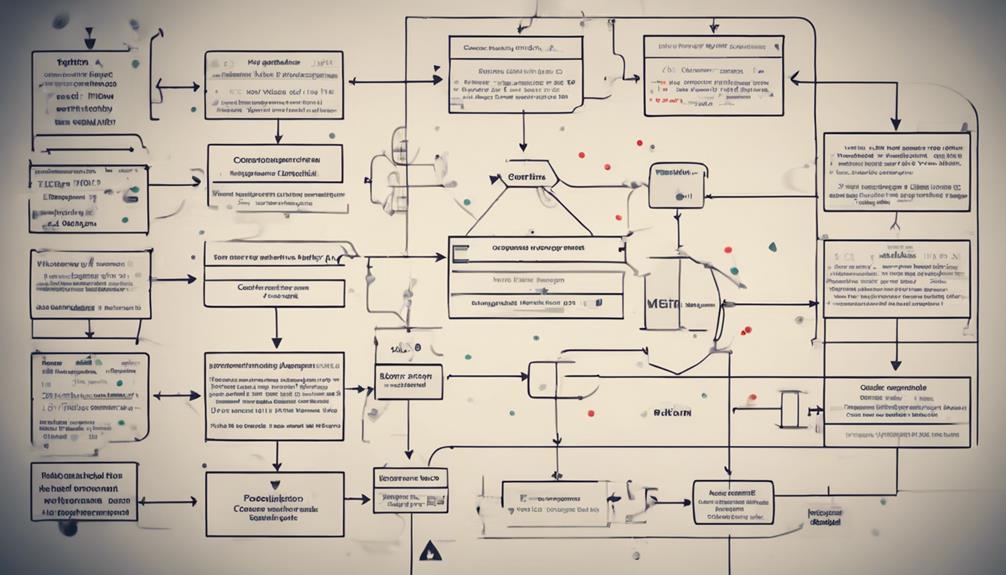Under new EU legislation, Google, Meta, and other tech giants must clarify their algorithms. This requirement promotes transparency and accountability in online content display. The aim is to combat misinformation, harmful content, and guarantee fair competition. Failure to comply may lead to penalties for these companies. The move signifies a notable shift towards increased transparency and user empowerment within digital environments. Further insights await regarding the implications of these algorithm disclosures.
Key Takeaways
- EU legislation mandates detailed algorithm explanations for tech giants.
- Transparency enhances trust, accountability, and fair competition.
- Compliance with Digital Services Act essential for Google, Meta, and others.
- Aim is to address misinformation, harmful content, and promote fairness.
- Failure to comply can lead to penalties for non-compliant companies.
EU Legislation Mandates Algorithm Transparency
Under new EU legislation, tech giants like Google and Meta are mandated to elucidate their algorithms to users. The EU regulations require transparency from these tech companies regarding how their algorithms function. The goal behind this mandate is to address the spread of misinformation and harmful content on online platforms.
By providing insights into their algorithms, companies can guarantee fair competition and foster user trust. Additionally, the legislation demands transparency reports from these companies to shed light on their algorithmic processes. Failure to comply with these transparency requirements could lead to penalties for the tech companies under the new regulations.
This move by the EU reflects a broader global trend towards holding tech giants accountable for the impact of their algorithms on society. Users will now have the opportunity to gain a better understanding of the inner workings of these algorithms and how they influence the information they see online.
Google's Algorithm Disclosure Requirement

Google must comply with the new EU legislation by providing detailed explanations for its algorithms. This requirement is part of the EU legislation focusing on transparency and accountability in content display, aiming to shed light on how algorithms are utilized by platforms like Google.
Users will gain insights into how algorithms influence the content presented to them on these platforms. By mandating algorithm disclosures, the EU legislation seeks to tackle misinformation, promote fair competition, and empower users with a deeper understanding of the content they encounter.
Google's adherence to the algorithm disclosure mandate is essential for aligning with the regulations outlined in the Digital Services Act within the EU. Through this initiative, users can expect increased transparency regarding the mechanisms behind content display on platforms, fostering a more informed and aware online environment.
Meta's Algorithm Explanation Obligation

Meta's Algorithm Explanation Obligation is essential under the new EU legislation, emphasizing transparency. This requirement necessitates Meta to provide clear insights into how their algorithms function.
The impact of this legislation on Meta's practices and the transparency it brings are significant points to take into account.
Meta's Transparency Requirement
The new EU legislation, the Digital Services Act (DSA), mandates that large platforms like Meta must be transparent about their algorithms, requiring Meta to explain how its algorithms function. This transparency requirement is an important aspect of compliance with the DSA.
By providing explanations for its algorithms, Meta aims to enhance the accountability and trustworthiness of its content moderation practices. Users will benefit from understanding how Meta's algorithms influence the content they encounter and engage with on the platform.
Meta's algorithm explanation obligation is vital for ensuring that the platform adheres to the rigorous regulations set forth by the DSA. This transparency initiative not only aligns Meta with regulatory standards but also serves to foster a more informed and empowered user base.
As Meta navigates these new requirements, the provision of algorithm explanations will be a key component in building and maintaining user trust within the digital landscape.
Algorithm Explanation Necessity
Users on Meta's platforms can now gain insights into the inner workings of their algorithms due to the new EU legislation, the Digital Services Act. Meta, among other tech companies, will be required to provide algorithm explanations under this legislation, enhancing transparency and accountability on platforms like Facebook, Instagram, Messenger, and WhatsApp. The Digital Services Act mandates that large online platforms such as Meta disclose how their recommender algorithms function to both users and regulators.
Meta's algorithm explanation obligation serves the purpose of helping users comprehend the mechanisms behind content recommendation, promotion, and moderation across their social media channels. By complying with the algorithm explanation requirements outlined in the DSA, Meta aligns itself with the legislation's objectives of promoting fair competition, combating misinformation, and safeguarding user rights. Through these measures, Meta aims to foster a more transparent and accountable online environment for its users, as mandated by the EU legislation.
EU Legislation Impact
Amid the evolving landscape of digital services regulation in the EU, tech companies like Meta face the necessity to provide insights into their algorithms under the Digital Services Act. This new legislation mandates that companies, including Meta, explain their algorithms to enhance transparency, combat misinformation, and guarantee fair competition in the digital sphere.
By requiring tech companies to disclose how their algorithms function, the Digital Services Act seeks to bolster user trust and promote accountability within these platforms. Users stand to benefit from a clearer understanding of Meta's algorithms, enabling them to critically assess potential biases and make more informed decisions while interacting with the platform.
Meta's compliance with the algorithm explanation requirement under the DSA is vital for addressing concerns related to content prioritization and fostering a more transparent approach to algorithm design. This shift towards greater algorithmic transparency signifies a significant step in the ongoing efforts to regulate digital services and protect user interests within the European Union.
Impact on Digital Market Competition

With the DMA now in effect, major tech companies are facing heightened scrutiny and regulations aimed at fostering a more competitive digital market. The Digital Markets Act (DMA) places a spotlight on tech companies like Google, Meta, and Apple, designating them as gatekeepers in the digital market.
To comply with the EU legislation, these companies must adhere to new regulations that target the algorithms they employ, seeking to address power imbalances and promote fair competition. Companies with at least 45 million monthly users are mandated to follow the DMA, which aims to rein in the dominance of large tech platforms.
Not only are tech giants such as Apple, Google, Amazon, Meta, and Microsoft affected, but other influential players like Booking and X (formerly Twitter) could soon face regulatory measures due to their significant market influence. Consequently, these companies have already started making compliance adjustments to their platforms in response to the DMA requirements, signaling a shift towards a more competitive digital landscape.
Regulatory Efforts for Tech Companies

The new EU legislation, particularly the Digital Services Act (DSA), is putting pressure on tech companies like Google and Meta to be transparent about their algorithms.
This move aims to guarantee accountability in how these firms handle misinformation and harmful content.
Additionally, the regulations will likely impact data privacy concerns related to algorithmic decision-making.
Algorithm Transparency Requirements
Under the new EU legislation, tech giants like Google and Meta are mandated to provide explanations for their algorithms to enhance transparency in their operations. The Digital Services Act (DSA) requires these companies to disclose how their algorithms function to combat misinformation and harmful content on online platforms. This move is part of regulatory efforts aimed at ensuring fair competition and holding tech companies accountable for their algorithmic decision-making processes.
To comply with the DSA requirements, tech companies must publish transparency reports detailing the inner workings of their algorithms. Non-compliance with the mandate to explain algorithms could lead to penalties, highlighting the significance of transparency in tech operations. By forcing tech companies to reveal how their algorithms influence the content users see, the EU seeks to create a more transparent digital environment that safeguards against misinformation and harmful content.
Accountability for Tech Firms
Tech firms face increased regulatory scrutiny regarding their accountability for content on their platforms. The new EU legislation, the Digital Services Act (DSA), places a strong emphasis on algorithm transparency, requiring companies like Google and Meta to explain how their algorithms function. Failure to comply with these requirements could lead to fines of up to 6% of their annual turnover. The DSA's focus on accountability and transparency is part of broader regulatory efforts aimed at combating misinformation, protecting user rights, and ensuring fair competition in the tech industry.
To provide a clearer understanding, the table below summarizes key points related to the accountability of tech firms under the DSA:
| Aspect | Details |
|---|---|
| Legislation | Digital Services Act (DSA) |
| Requirement | Explanation of algorithms by tech companies |
| Consequence | Fines of up to 6% of annual turnover for non-compliance |
| Objective | Promote accountability and transparency in tech operations |
Impact on Data Privacy
Increased regulatory scrutiny on tech firms regarding algorithm transparency under the new EU legislation is driving efforts to enhance data privacy protections.
The mandate for companies like Google and Meta to provide explanations for their algorithms is a step towards addressing concerns surrounding data privacy and algorithmic decision-making.
By complying with these regulations, tech companies are working to guarantee that users have a clearer understanding of how algorithms influence their online interactions.
This regulatory push emphasizes the importance of data privacy and user rights within the domain of algorithmic decision-making processes.
As tech companies adjust their practices to meet the transparency requirements outlined in the EU regulations, the focus remains on fostering a more secure and informed digital environment.
Ultimately, the goal is to empower users to make informed choices and to hold tech companies accountable for the impact of their algorithms on data privacy and user experiences.
Transparency and Accountability in Algorithms

Amidst the growing concerns over online content manipulation, the new EU legislation mandates that tech giants like Google and Meta must provide clear explanations for the functioning of their algorithms. This move towards transparency in algorithms is vital in combating misinformation, guaranteeing fair competition, and promoting user trust.
Users will gain valuable insight into how content is prioritized and personalized on platforms like Google and Meta, fostering a more informed online experience. Additionally, clear explanations of algorithms not only enhance accountability but also allow for scrutiny of potential biases, contributing to a more equitable digital environment. Compliance with these transparency requirements will be obligatory for tech companies operating within the EU.
- EU Legislation Mandate: Tech giants such as Google and Meta are required to provide clear explanations of their algorithms.
- Purpose of Transparency: Transparency in algorithms aims to combat misinformation, ensure fair competition, and promote user trust.
- User Insight: Users will have visibility into how content is prioritized and personalized on platforms like Google and Meta.
- Enhanced Accountability: Clear explanations of algorithms enhance accountability and allow for scrutiny of potential biases.
Digital Services Act Requirements

In the domain of digital services, adherence to the Digital Services Act requirements is essential for tech companies seeking to maintain compliance and transparency in their algorithm operations. The EU legislation, known as the Digital Services Act (DSA), places a strong emphasis on algorithm transparency to combat misinformation and guarantee a level playing field in the digital sphere.
Companies like Google and Meta will be mandated to provide clear explanations of their algorithms, impacting their content moderation strategies and user trust on online platforms. Failure to comply with the DSA could lead to fines of up to 6% of the company's annual turnover, underscoring the critical importance of transparency in algorithm operations.
Addressing Tech Companies' Power Dynamics

Tech companies' power dynamics are being addressed through increased transparency and accountability in their algorithmic decision-making processes. This shift is a response to the recognized power imbalances that exist within the tech industry, particularly among giants like Google and Meta.
The new EU legislation emphasizes the following key points:
- Transparency: Tech companies will be required to provide clear explanations for how their algorithms function, giving users insight into the mechanisms shaping the content they encounter on platforms such as Google and Meta.
- Accountability: By mandating algorithmic explanations, the legislation holds tech companies responsible for the impact of their algorithms, fostering a culture of accountability and oversight.
- Addressing Power Imbalances: The legislation aims to level the playing field by reducing asymmetries of power, ensuring that users have a better understanding of how tech companies utilize algorithms to curate digital content.
- Enhancing Algorithmic Decision-Making: Through increased transparency and accountability, the new EU law seeks to enhance users' ability to navigate digital platforms by providing them with the necessary information to engage with content more consciously.
Algorithmic Process Disclosure Mandate

Under the new EU legislation, companies like Google and Meta face a mandate to disclose the inner workings of their algorithms. This algorithm transparency requirement seeks to address concerns related to misinformation, promote fair competition, and bolster user trust in online platforms.
The aim is for these companies to provide detailed algorithm explanations to enhance accountability and enable the identification of potential biases. This disclosure mandate is a vital aspect of the Digital Services Act (DSA) in the EU, which imposes stringent regulations on online platforms to guarantee a more transparent and secure digital environment.
Failure to adhere to the algorithm explanation mandate could lead to significant penalties, potentially amounting to 6% of a company's annual turnover under the DSA. By enforcing this requirement, the EU aims to cultivate a more responsible and trustworthy online ecosystem, where users can better understand the processes that shape their digital experiences.
Online Environment Fairness Initiative

The Online Environment Fairness Initiative mandates tech giants like Google and Meta to disclose how their algorithms function, aiming to foster transparency and accountability.
By enforcing algorithm transparency requirements, the initiative seeks to promote fair online practices and combat misinformation effectively.
Tech companies must guarantee compliance with these regulations to align with the new EU legislation and uphold ethical standards in the digital sphere.
Algorithm Transparency Requirements
Ensuring fairness and accountability in the online ecosystem, companies within the EU will now be obligated to provide detailed explanations for their algorithms under the Digital Services Act. This legislation, part of the European Union's efforts to promote transparency and combat misinformation online, specifically includes Algorithm Transparency Requirements that tech giants like Google and Meta must adhere to.
Here are four key points regarding these requirements:
- Enhancing User Trust: By disclosing how algorithms function, companies can build trust with users and demonstrate a commitment to transparency.
- Combatting Misinformation: Transparency in algorithm operations can help mitigate the spread of false information and promote a more accurate online environment.
- Promoting User Empowerment: Understanding how algorithms impact content presentation empowers users to make informed decisions and reduces the risk of potential biases.
- Data Utilization Disclosure: Companies are mandated to explain how user data is utilized for personalization and content prioritization, fostering a more transparent relationship between users and online platforms.
Accountability for Tech Giants
Tech giants like Google and Meta face heightened accountability requirements as part of the Online Environment Fairness Initiative. This initiative mandates that platforms provide algorithmic transparency to increase accountability for how algorithms shape user experiences. By disclosing how their algorithms function, companies aim to guarantee fairness, mitigate potential biases in content delivery, and address concerns about user trust in online environments.
The EU legislation underscores the importance of tech giants like Google and Meta explaining their algorithms to users. Through these explanations, users can better comprehend how their online experiences are influenced, empowering them to make more informed choices. Ultimately, greater accountability and transparency regarding algorithms are essential for fostering trust between tech giants and users, aligning with the goals of the Online Environment Fairness Initiative and the broader objectives of EU legislation on digital platforms.
Ensuring Fair Online Practices
Amid increasing calls for transparency, online platforms must now provide clear explanations of their algorithms to users under the Online Environment Fairness Initiative. This initiative, mandated by EU legislation, requires tech giants like Google and Meta to disclose how their algorithms work to promote fair competition and combat misinformation. By guaranteeing transparency in how online platforms prioritize and present content to users, the initiative aims to enhance accountability in tech companies.
Users will have the opportunity to understand how algorithms impact their online experience, empowering them to make informed choices. This move towards transparency not only benefits users but also fosters a more equitable online environment. By shedding light on the inner workings of algorithms, online platforms can uphold fairness and combat any potential biases or manipulation that may exist in the digital domain. Ultimately, the Online Environment Fairness Initiative serves as a significant step towards creating a more transparent and just online landscape.
- Tech giants like Google and Meta are required to provide clear explanations of their algorithms under the EU legislation.
- The initiative aims to ensure transparency in how online platforms prioritize and present content to users.
- Companies must disclose how their algorithms work to promote fair competition and combat misinformation.
- Users will have the opportunity to understand how algorithms impact their online experience and make informed choices.
Major Tech Companies' Accountability

Major tech companies like Google and Meta face increased scrutiny and accountability under the new EU legislation, specifically the Digital Services Act (DSA). This legislation mandates transparency regarding algorithms to combat misinformation and promote fair competition in the online domain.
By requiring companies to explain how their algorithms function, the DSA aims to enhance user trust, enable scrutiny for potential biases, and empower individuals to make informed choices on digital platforms. Google, Meta, and other tech giants will now need to provide detailed insights into their algorithmic processes to comply with these new regulations.
The accountability demanded by the DSA will drive a notable increase in transparency concerning policies, content moderation practices, and risk assessments by these major tech companies. This shift towards greater accountability is a significant step in ensuring that online platforms operate ethically and in a manner that promotes trust and fairness among users.
Algorithm Explanation for Google and Meta

Google and Meta must provide clear explanations of their algorithms as mandated by the new EU legislation, the Digital Services Act (DSA). This requirement aims to enhance algorithm transparency and combat misinformation effectively. To comply with the DSA and promote transparency, the following steps are vital for Google and Meta:
- Clearly outlining how their algorithms function to prioritize and recommend content.
- Helping users understand the decision-making process behind the content they see on platforms.
- Ensuring that algorithm explanation processes are detailed and accessible to users.
- Adhering to the DSA's guidelines on algorithm transparency to avoid penalties and maintain compliance.
New EU Law and Algorithm Explanations

The new EU legislation mandates that tech giants such as Google and Meta must offer insights into their algorithmic processes. This requirement aims to enhance transparency and combat misinformation and harmful content.
The impact of these transparency measures on digital innovation and accountability for major tech players is a significant focal point of the new law.
Algorithm Transparency Requirements
Under the new EU legislation, tech giants are now required to provide users with explanations for their algorithms. This algorithm transparency requirement is vital in combating misinformation and harmful content on online platforms.
By mandating tech giants like Google and Meta to offer insights into how their algorithms function, the EU legislation aims to guarantee fair competition in the digital landscape. To comply with these regulations, tech firms must furnish transparency reports that outline the workings of their algorithms.
Such algorithm explanations play a pivotal role in fostering accountability and trust within online platforms, as users can better understand why they see certain content and how decisions are made by these tech companies.
Accountability for Tech Giants
Tech giants are now obligated to provide detailed explanations for their algorithms under the new EU legislation, the Digital Services Act (DSA).
This legislation mandates transparency regarding how algorithms function, aiming to combat misinformation, promote fair competition, and safeguard user rights. Companies that fail to comply with the DSA could face fines of up to 6% of their annual turnover, underscoring the importance of providing algorithm explanations.
The EU legislation seeks to enhance accountability for tech giants concerning the content on their platforms and increase transparency in their operations. By requiring algorithm explanations under the DSA, users will be able to understand how content is prioritized, fostering trust and enabling informed decision-making.
This move towards accountability and transparency represents a significant step in regulating tech giants and promoting a more transparent online environment in the EU.
Impact on Digital Innovation
Introducing a pivotal shift in digital innovation, the new EU legislation mandates tech giants to provide detailed explanations of their algorithms to users. This move is set to have a significant impact on various aspects of digital innovation:
- Explaining Algorithms: Tech giants like Google and Meta will now need to offer thorough insights into how their algorithms function, increasing transparency for users.
- Promoting User Trust: By allowing users to understand the inner workings of algorithms, the legislation aims to enhance trust between users and tech companies.
- Scrutiny of Biases: Users will have the opportunity to examine potential biases within algorithms, fostering a more balanced and fair online environment.
- Enhancing Accountability: With increased algorithm transparency, tech companies will be held more accountable for the outcomes of their algorithms, aligning with the EU's efforts to guarantee fair competition and protect user rights in the digital sphere.
Tech Giants' Compliance With EU Legislation

Amidst the new EU legislation, tech giants like Google and Meta are facing the requirement to transparently explain their algorithms under the Digital Services Act (DSA). Compliance with the DSA mandates that these companies make their recommender algorithms transparent to users, enhancing accountability within their platforms.
Additionally, they're obligated to offer users the option of a non-profiling-based recommender system to align with the DSA's stipulations. The use of dark patterns in user interfaces to manipulate user choices is explicitly prohibited under the DSA regulations.
Detailed obligations and guidelines concerning algorithm transparency are outlined in official documents associated with the DSA. These provisions aim to ensure that tech giants operate in a manner that's fair, transparent, and respectful of user autonomy within the digital domain. By complying with these regulations, companies like Google and Meta are expected to foster a more trustworthy online environment for their users in line with the EU legislation.
Algorithm Transparency in Digital Markets

Enhancing transparency in digital markets, the requirement for tech giants like Google and Meta to provide explanations for their algorithms is a pivotal step towards promoting user understanding and accountability in online platforms. This move, mandated by new EU legislation, aims to address the importance of algorithm transparency in shaping how content is prioritized and recommended on these platforms.
Here are key points to contemplate:
- User Empowerment: Algorithm transparency empowers users by offering insights into how information is filtered and presented to them.
- Combatting Misinformation: By disclosing algorithmic processes, tech giants can aid in the fight against misinformation and guarantee the delivery of accurate content.
- Fair Competition: The EU laws seek to establish fair competition by revealing the mechanisms that influence content visibility.
- Accountability and Oversight: Requiring detailed reports on algorithm workings fosters accountability among tech companies and allows for scrutiny of potential biases in content delivery.
Compliance with these regulations will be vital for tech giants to navigate the evolving landscape of digital markets while maintaining user trust and regulatory adherence.
Frequently Asked Questions
What Is the EU Case Against Meta?
The EU's case against Meta involves the requirement for the company to elucidate its algorithms under the Digital Services Act (DSA). This directive extends to other tech giants as well, necessitating transparency regarding algorithm functionality to adhere to EU regulations.
This initiative aims to empower users to comprehend and evaluate the algorithms utilized by platforms like Meta, contributing to the EU's efforts to combat misinformation and harmful content by ensuring accountability in algorithmic processes.
What Is the EU Digital Media Act?
The EU Digital Services Act (DSA) requires tech companies to provide explanations of their algorithms to users. This legislation mandates transparency in algorithm operations, aiming to combat misinformation, guarantee fair competition, and hold tech giants accountable.
Companies must disclose how their recommender algorithms function to comply with the DSA, impacting global tech firms and influencing content moderation strategies worldwide.
The DSA seeks to bring transparency and accountability to the digital domain, shaping how online platforms operate.
What Is the New Digital Law in Europe?
The new digital law in Europe, known as the Digital Services Act, aims to enforce transparency and accountability in how tech companies operate. This legislation requires companies to disclose how their algorithms function to users.
What Is the Digital Services Act February 2024?
The Digital Services Act of February 2024 aims to enhance transparency and accountability in online platforms' content moderation and algorithmic processes.
This legislation requires tech companies to explain their algorithms to users, ensuring clearer understanding of how content is curated and moderated.
By mandating swift removal of illegal content and providing avenues for users to appeal decisions, the DSA sets a standard for responsible online conduct.
Companies with significant EU user bases will face heightened scrutiny and penalties for noncompliance.
Conclusion
In a digital world where algorithms reign supreme, the new EU legislation requiring transparency from tech giants like Google and Meta is a step towards shedding light on the mysterious inner workings of these complex systems.
Just as a magician reveals their tricks, these companies will now have to explain the magic behind their algorithms.
This move aims to level the playing field and guarantee fair competition in the ever-evolving digital market landscape.










